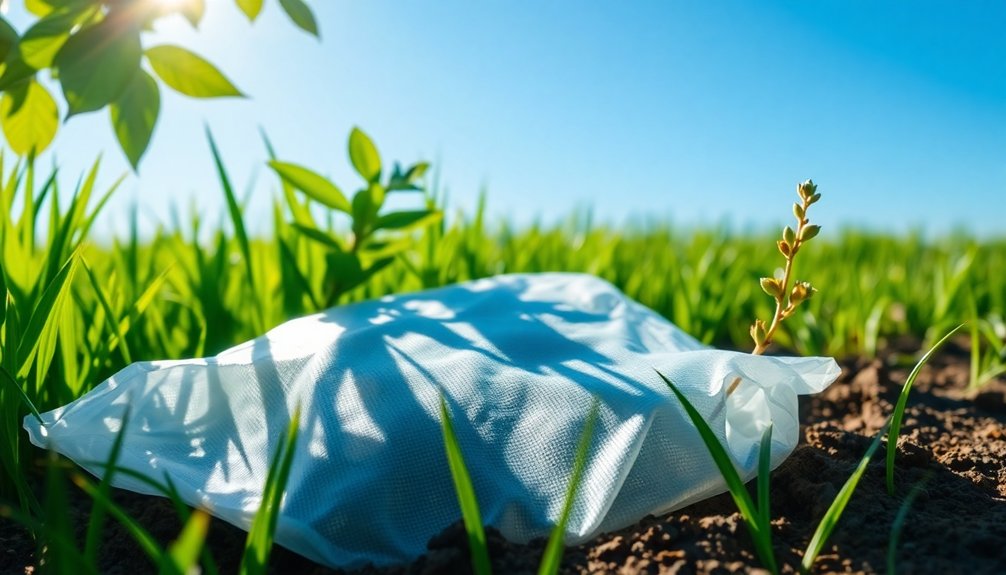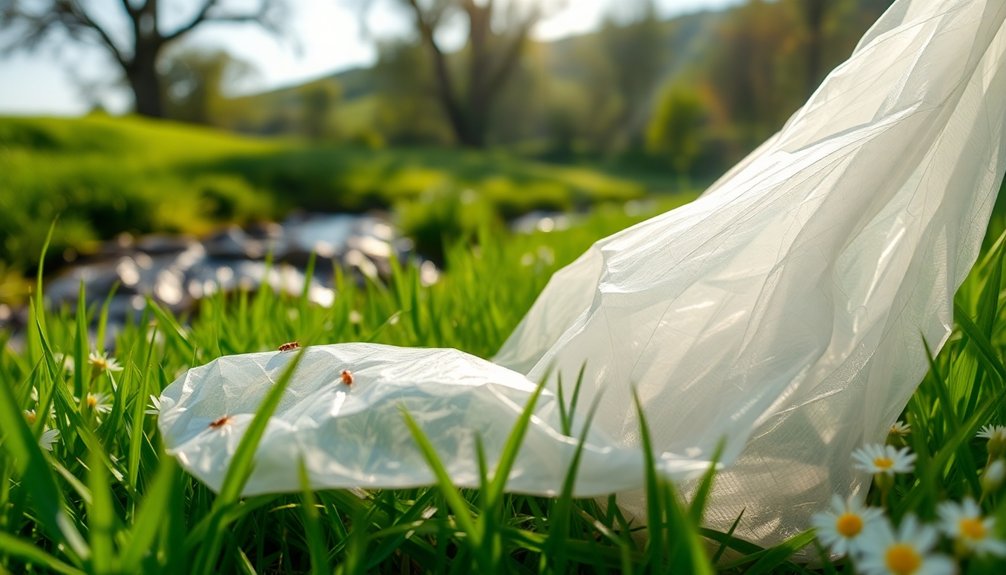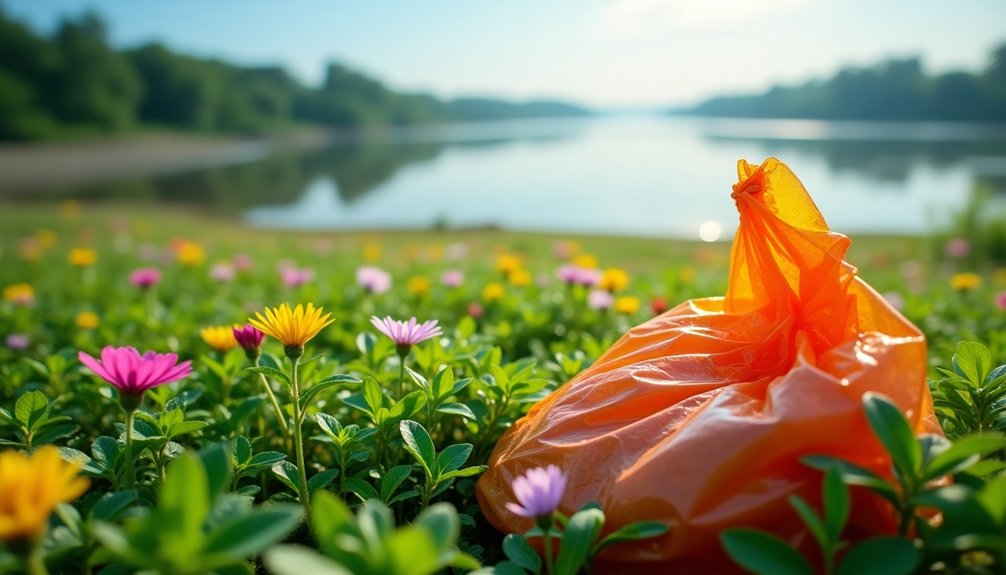Polypropylene bags aren't biodegradable; they can take hundreds of years to break down, significantly harming the environment. While they're durable and recyclable, only about 1% of these bags actually get recycled. Their long lifespan means they often end up in landfills or natural spaces, contributing to plastic pollution. Although they have a lower carbon footprint during production compared to some other plastics, their non-degradability poses serious environmental challenges. To truly understand their impact and explore better alternatives, consider exploring further into this topic.
Key Takeaways
- Polypropylene bags are not biodegradable and can take hundreds of years to decompose in the environment.
- They contribute significantly to plastic pollution, with around 100 billion issued annually in Europe.
- The production of polypropylene generates high carbon emissions and energy consumption, impacting the environment.
- Effective recycling strategies are necessary, as the global post-consumer recycling rate for polypropylene is only about 1%.
- Encouraging the reuse of polypropylene bags can help reduce waste generation and mitigate environmental impact.
Understanding Polypropylene Bags
Polypropylene bags, often recognized for their durability, are made from a thermoplastic polymer derived from petroleum. This material gives them resistance to wear, making them a preferred choice for many consumers.
However, it's important to understand that while polypropylene is rated as recyclable (No. 5 under the Resin Identification Code), the recycling rates for these plastic bags remain frustratingly low.
Unlike biodegradable plastics, polypropylene bags don't decompose in natural environments and can take hundreds of years to break down, contributing significantly to plastic pollution. Their production emits less carbon dioxide compared to conventional plastics, which gives them a lower overall carbon footprint.
Still, the long-term environmental impacts of non-biodegradable polypropylene bags warrant concern. To mitigate their effects, proper disposal and effective recycling processes are crucial.
When you take used polypropylene bags to a recycling facility, you help lessen their environmental burden. Understanding the implications of using these bags is key to making informed choices. Polypropylene bags are an example of thermoplastic polymers, which exhibit excellent durability and moisture resistance, making them widely used in packaging.
Environmental Impact of Plastics
Plastic pollution poses a significant threat to ecosystems and human health, affecting everything from ocean life to urban environments. You mightn't realize that polypropylene (PP) waste plays a major role in this issue, contributing to the staggering amount of plastic waste generated globally. With around 100 billion plastic bags issued annually in Europe alone, the potential for solid waste accumulation is enormous. The production of polypropylene raises serious environmental concerns, primarily due to its substantial carbon emissions and energy consumption. Even though biodegradable plastics are often marketed as a solution, they can still pose problems. Studies show they often have low degradation rates in natural settings, leading to microplastic formation, which further pollutes our ecosystems. Additionally, some biodegradable plastic shopping bags contain higher levels of toxic elements than conventional plastics, raising significant health and environmental safety issues. To combat plastic waste effectively, we need to rethink our reliance on polypropylene and explore sustainable alternatives. Only through conscientious choices and better waste management strategies can we minimize the impact of plastic on our planet. Furthermore, the alarming rate of microplastic ingestion by marine species highlights the urgent need for sustainable alternatives to polypropylene.
Life Cycle of Polypropylene

Understanding the life cycle of polypropylene (PP) helps highlight its environmental implications. The life cycle begins with resource extraction, where raw materials undergo significant energy consumption and carbon emissions during production.
Life cycle assessment (LCA) studies have shown that this manufacturing phase substantially contributes to the overall environmental impact of PP.
Once produced, PP bags are used for a long lifespan, which can minimize the frequency of replacement and potentially reduce waste generation over time.
However, the disposal stage poses challenges. PP bags don't degrade easily, leading to persistent environmental issues if not managed properly.
LCA findings emphasize the necessity of effective recycling strategies to mitigate PP's environmental footprint. By improving recycling methods, you can promote resource conservation and lessen the carbon emissions associated with producing new polypropylene.
Moreover, adopting polypropylene recycling processes that conserve resources and minimize waste generation can have a significant impact on the environmental sustainability of polypropylene products.
Understanding these stages can empower you to make more informed choices about using and disposing of polypropylene products, ultimately impacting the environment positively.
Recognizing the implications of each step in the life cycle is crucial for fostering sustainable practices in your everyday life.
Recycling and Management Strategies
While many people use polypropylene (PP) bags daily, managing their end-of-life effectively is crucial for minimizing environmental impact. Proper recycling of these bags involves shredding, melting, and reforming them into new products. However, this process requires specialized equipment, which isn't always available at local facilities. It's essential to verify if your local recycling facility accepts PP bags, as not all can process them effectively. To ensure successful recycling, make sure your PP bags are cleaned and dried before disposal to prevent contamination that could hinder the recycling process. Unfortunately, the recycling rate for PP bags remains relatively low, highlighting the need for innovative technologies and comprehensive policy frameworks to improve waste management strategies, especially in the Gulf Cooperation Council (GCC) region. Additionally, encouraging the reuse of PP bags can significantly reduce waste, fostering a more sustainable approach to plastic consumption. Since recycling infrastructure is unevenly distributed, residents should check if their local facilities can handle PP bags for proper disposal.
| Action | Impact |
|---|---|
| Recycle PP bags | Reduces plastic waste |
| Clean and dry bags | Ensures effective recycling |
| Reuse bags | Minimizes environmental harm |
Assessing Biodegradability Concerns

When it comes to polypropylene (PP) bags, many people might be surprised to learn that they're not biodegradable. Instead, they can take hundreds of years to decompose, significantly contributing to long-term plastic pollution. This poses serious challenges for waste management and environmental health.
While PP bags are reusable and recyclable, the reality is that their slow degradation time leads to a build-up of plastic waste in landfills and natural habitats.
Despite the availability of biodegradable alternatives, research indicates that they don't always provide better environmental outcomes than conventional plastics like PP. Issues such as microplastic formation and toxicity remain concerning. The low recycling rates for polypropylene further exacerbate these issues, highlighting a pressing need for improved waste management strategies. Moreover, the global post-consumer recycling rate for polypropylene is around 1%, highlighting significant waste management challenges.
You might consider the environmental impact of your choices. By opting for reusable bags or advocating for better recycling practices, you can help reduce plastic pollution.
Educating yourself and others about the limitations of polypropylene bags can also be a step towards more sustainable practices. Remember, every small action counts in the fight against plastic pollution.
Frequently Asked Questions
Are Polypropylene Bags Eco-Friendly?
Yes, polypropylene bags can be eco-friendly. Their reusability reduces single-use waste, and they have a lower carbon footprint during production compared to alternatives. Recycling them properly also helps conserve resources and minimize environmental impact.
Is Polypropylene Environmental Friendly?
You might find polypropylene bags to be more environmentally friendly than other options. They're recyclable and durable, reducing waste. However, their fossil fuel origin means they still pose challenges for long-term sustainability and pollution management.
What Is the Environmental Impact of Polyethylene Bags?
Polyethylene bags contribute significantly to pollution, taking centuries to degrade. They emit greenhouse gases during production, create microplastics, and often end up in landfills, harming ecosystems. You should consider alternatives for a healthier environment.
What Are the Environmental Impacts of Biodegradable Bags?
Biodegradable bags can create environmental issues too. They often break down slowly, releasing toxic elements and contributing to microplastic pollution. You should consider their disposal methods and potential health risks before opting for them.

